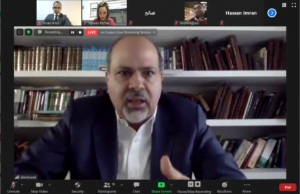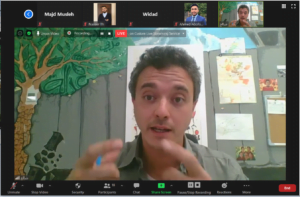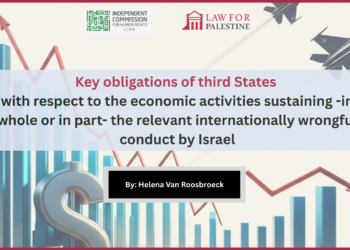Within the monthly seminars of the Jurists for Palestine Forum, on Saturday 14 November 2020, Law for Palestine Organization, held an online panel discussion on the legal status of the Boycott, Divestment, and Sanctions (BDS) movement around the world.
The meeting was hosted by Dr. Abed Awad, the US-Palestinian lawyer and Assistant professor of international law, and Saleh Hijazi, Amnesty International’s Deputy Regional Director for the Middle East and North Africa. Besides, Several researchers, academics, and students participated in the webinar, including Dr. Ammar Dweik, Director of the Independent Commission for Human Rights in Palestine, and Dr. Moayad Hattab, Former dean of the Faculty of Law at An-Najah National University in Nablus, and Dr. Alaa Bani Fadel, Professor of International Law at An-Najah National University, and Dr. Ahmed Khalifa, Professor of International Criminal Law in Egypt, while the panel discussion was moderated by Rawan Al-Husseini, Member of the Board of Trustees of Law for Palestine.

The meeting, which was broadcast live to the members of Jurists for Palestine Forum, dealt with introducing the global boycott movement and its legal status in different countries of the world between permission and criminalization, in terms of the different legal challenges that it is facing in several countries.
The boycott movement defines itself as a popular and peaceful means of pressure that aims to end the Israeli occupation and all forms of apartheid against the Palestinians and supports the right of return for Palestinian refugees by practicing boycott, divestment, and sanctions against Israel.
In his intervention, Dr. Awad indicated that more than 169 anti-BDS laws were submitted in the USA, 47 of which were passed at the state level, and these laws included rules that prevent the USA from contracting with institutions and companies that support the boycott movement, and undermine the activity of student unions in supporting the BDS.
Furthermore, Dr. Awad pointed out that there is a federal bill that criminalizes boycotting Israel and imposes a prison sentence on those who do so, as it was presented for the first time in 2017, then again in 2019, but it has not passed, and it is expected to be submitted again in 2021.

Dr. Awad said that there are recent attempts with the support of the office of U.S. President Donald Trump to set a broad definition of “anti-Semitism” so that any criticism of Israel could fall within the definition of “anti-Semitism”, which means that the work of the boycott movement in the US is largely restricted.
Hijazi said that Amnesty International is making efforts to protect the right to boycott as a form of freedom of expression, including the call to boycott Israel. Additionally, Hijazi pointed out that Israel considers the boycott movement an existential strategic threat so that the Ministry of Strategic Affairs is fighting the movement with huge budgets and recruiting Israeli embassies around the world for this.
Hijazi added that the Israeli Knesset had passed a law to confront the BDS, according to which the call for a boycott was described as a civil violation requiring punishment and compensation, and in 2017, Israel introduced an amendment that prohibits anyone working on the boycott or supporting the boycott from entering Israel. In the world, it published a blacklist of 20 organizations that it considered as supporting organizations for the boycott movement and prevented their employees from entering the OPT, including Jewish organization such as the Jewish Voice for Peace, in addition to the revocation of the residence permit of Omar Shaker, the director of Human Rights Watch (HRW).

In Europe, according to Hijazi, anti-Semitism was used as a weapon to attack the boycott movement, as laws were proposed to equate the call for the boycott with anti-Semitism in both Germany and Austria. In France, activists have already been prosecuted for calling for a boycott of Israeli products on charges of racial discrimination against Israelis, but this ruling was refuted by the European Court of Human Rights (ECHR), which condemned France for violating the freedom of expression of these people.
In the meeting, the attendees discussed the legal courses that supporters or opponents of the boycott movement are working on, especially in the US, while comparing the situation of the call for boycotting Israel with other situations that occurred or might occur if the call for boycotting other countries was made based on their record in violating human rights.
It is noteworthy that this panel discussion comes within the activities of the Jurist for Palestine Forum of the Law for Palestine Organization, which includes holding a monthly virtual seminar that hosts international experts, with the participation of researchers, students, and interested people from different countries of the world to discuss questions and developments related to international law and Palestine, In addition to the effective networking between jurists interested in Palestine from all over the world.





